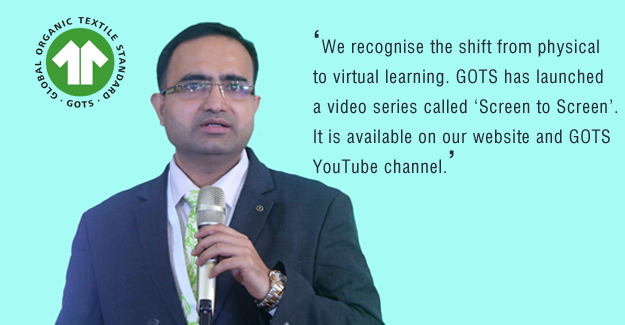
'Buyers Prefer GOTS Certified Companies Over Uncertified Ones Even For Orders That Don’t Include Organic Fibres'
The Indian textile and apparel industry is becoming increasingly aware of its social and environmental responsibilities, which explains why Indian manufacturers are opting for GOTS certification. In an exclusive interview with Reena Mital, Sumit Gupta, Deputy Director, Standards Development & Quality Assurance, GOTS, discusses the growing importance and need for GOTS certifications in the textile and clothing industry, and how GOTS is geared up to help the industry attain sustainability even in these restrictive times. How has GOTS certifications increased over the last two years in India, and other important South Asian markets? In 2019, GOTS witnessed highest growth ever, with a 35% increase from 5,760 to 7,765 facilities located in 70 countries. In terms of total numbers of certified facilities, the highest increase was reported from Bangladesh (+505), followed by India (+438). From South Asia, India (2411), Bangladesh (1194) and Pakistan (276) were among the top 10 countries, while Sri Lanka had 62 facilities. India has held on to the top position since 2008. India, Bangladesh and Pakistan were among top 10 countries in year 2018 as well. Since January 2018, I have been particularly focusing on Indian retailers. Indian consumers should also have easy access to certified organic textile products. Which sectors are more forthcoming for GOTS certifications? Why, according to you, have some sectors lagged in the same? Most clients are in apparel sector. This is followed by home textiles and mattresses. Sportswear or performance wear, that has a higher percentage of synthetic fibres by material composition, is lagging since GOTS Goods should have at least 70% natural organic fibres. GOTS covers the whole supply chain till first processing stage of textile fibres. Therefore, GOTS certified entities include the whole chain from final product to ginning unit (for cotton). For other fibres, first processing stage post organic production must become GOTS certified. What benefits have companies reaped because of GOTS certifications? GOTS serves as a credible third party claim to verify sustainability related credentials of a company. Most of the conformance requirements are applicable for the whole year, even when GOTS goods are not being processed at a facility. This includes social criteria, environmental criteria, ethical business behaviour, etc. Buyers prefer GOTS certified companies over uncertified ones even for the orders that do not include organic fibres. The pandemic has resulted in a drastic fall in textile and apparel consumption. Moreover, a number brands are now opting for anti-microbial and other chemical treatments. In the given economic scenario, and with increased focus on preventing Covid-19 through chemical treatments on textiles, where does GOTS stand? Have you witnessed more demand for your services due to the pandemic? During April and May, there was a drop in enquiries as most of the factories were closed due to Covid-19 related pandemic. But from June 2020 onwards, we are getting new queries from textile companies to become GOTS certified. Similarly, new queries are coming in from chemical suppliers as well. Anti-microbial treatment using synthetic chemicals is not permitted under GOTS. Other treatments can possibly be included if they meet GOTS criteria for approval of inputs and wet processing of textiles. How are GOTS approved certifiers conducting inspections in these times? Certification services for GOTS are offered by GOTS Approved Certifiers. Mostly they have local teams of inspectors for on-site audits. A broad approval has been given to certifiers and they may extend an existing scope certificate for three months. I have learned that on-site inspections have started in some parts of the world. For the areas where travel restrictions are still in place, certifiers may decide to conduct avirtualaudit. A new GOTS certificate can also be issued via virtual audit. But wet processing units shall have to wait for an on-site inspection since they carry a higher risk. What is GOTS strategy going forward? We recognise the shift from physical to virtual learning. GOTS has launched a video series called ‘Screen to Screen’. It is available on our website and GOTS YouTube channel. Several aspects of the standard, labelling, changes in version 6.0, GOTS Water/Energy Tool, website content, etc. are included in this series to create more awareness. We are also participating as speakers in industry webinars. Besides, we are planning to come up with a database of GOTS Approved inputs and accessories. Moreover, a revised Policy for Issuing Letters of Approval for GOTS Additives shall be released in coming days. We are also strengthening our control system on use of GOTS logo in the market. How do you see the situation in the textile and apparel industry panning out, post-lockdown? When do you expect new normalcy to set in? And what according to you will be the new normal? The pandemic reminded us of the need to live in harmony with nature. I also read some articles that reported an increase in demand for organic products during this period. As it is evident already, different regions shall take dissimilar time to come back to normal. I think that people shall use the latest learnings to create a new normal, while still retaining the existing positive aspects. Human ambitions and creativity are limitless. We will come out stronger from these challenging times.
Textile Excellence
If you wish to Subscribe to Textile Excellence Print Edition, kindly fill in the below form and we shall get back to you with details.












